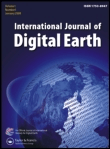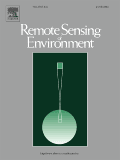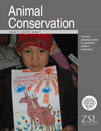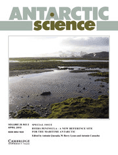
Remote Sensing in Ecology and Conservation
metrics 2024
Advancing ecological insights through cutting-edge technology.
Introduction
Remote Sensing in Ecology and Conservation is a pioneering journal published by WILEY that has been a beacon of open-access research since 2015. With an E-ISSN of 2056-3485, this journal stands at the forefront of the intersection between ecological research and technological innovation. It is recognized for its significant impact, boasting Q1 rankings across several prestigious categories in 2023, including Computers in Earth Sciences and Ecology, emphasizing its commitment to high-quality, influential scholarship. The journal provides a platform for researchers and practitioners to share their findings in remote sensing applications that advance ecological conservation efforts. Encompassing a broad scope that includes studies on landscape changes, biodiversity assessments, and environmental monitoring, it serves as an essential resource for education and practice in the field. With impressive ranks in Scopus, including a remarkable 6th place in Earth and Planetary Sciences, it continues to shape the dialogue in ecology and conservation. As an open-access journal, it champions the dissemination of knowledge, making critical research accessible to a global audience, thereby fostering innovation and collaboration in the pursuit of sustainable environmental practices.
Metrics 2024
 -
- 3.90
3.90 5.10
5.10 -
-Metrics History
Rank 2024
IF (Web Of Science)
JCI (Web Of Science)
Quartile History
Similar Journals

Ecological Indicators
Innovating insights into biodiversity and ecosystem health.Ecological Indicators, published by Elsevier, is a prestigious journal dedicated to advancing the fields of ecology and environmental science. With an impressive impact factor and ranked in the Q1 quartile for both Ecology and Decision Sciences categories, the journal serves as a vital resource for researchers and professionals aiming to apply ecological knowledge to real-world problems. The journal covers a broad scope of topics within ecological indicators, aiming to provide comprehensive insights into biodiversity, ecosystem health, and sustainability metrics. Founded in 2001 and continuing through 2024, Ecological Indicators has established itself as a leader in disseminating significant research and innovative findings. The journal's standing is reflected in its remarkable Scopus ranks, placing it among the top percentile in its respective categories. Authors are encouraged to submit their work to share vital findings with an engaged audience of researchers, professionals, and dedicated students, ensuring the continued relevance and impact of ecological research on global environmental policies and practices.

European Journal of Remote Sensing
Leading the Charge in Atmospheric and Environmental ResearchThe European Journal of Remote Sensing, published by Taylor & Francis Ltd, stands as a pivotal resource in the domains of applied mathematics, atmospheric science, and earth sciences. Since its transition to Open Access in 2012, the journal has facilitated unrestricted knowledge dissemination, fostering collaboration and innovation among researchers. With a notable impact factor reflected in its quartile rankings—achieving Q2 in applied mathematics and atmospheric science, and Q1 in miscellaneous environmental science—the journal is a respected platform for high-quality research. Based in the United Kingdom, it encompasses a wide range of topics related to remote sensing technologies and their application in environmental monitoring. Researchers and professionals in these fields will find the journal indispensable for its commitment to advancing scientific understanding and promoting the use of remote sensing methodologies in tackling contemporary environmental challenges.

International Journal of Digital Earth
Exploring the intersection of Earth and technology.Welcome to the International Journal of Digital Earth, a premier open-access journal published by Taylor & Francis Ltd, dedicated to advancing the field of digital geoscience. With its ISSN 1753-8947 and E-ISSN 1753-8955, this journal has established itself as a vital resource for scholars and practitioners alike since its inception in 2008. The journal is at the forefront of interdisciplinary research, showcasing a diverse scope from Earth sciences to computer science applications, evidenced by its impressive ranking in the 2023 Scopus database. It holds a Q1 categorization in Earth and Planetary Sciences, with a percentile rank among the top 16% of its peers, and also stands out in the Q2 quartile for both Computer Science Applications and Software disciplines. The journal's commitment to open access, established in 2022, underscores its dedication to disseminating knowledge and fostering collaboration. By providing a platform for high-quality research, the International Journal of Digital Earth plays a critical role in addressing the complexities of our changing planet through innovative digital solutions. Whether you are an experienced researcher or a student, this journal is an essential addition to your academic toolkit.

REMOTE SENSING OF ENVIRONMENT
Innovative Imaging for a Changing Planet.REMOTE SENSING OF ENVIRONMENT, published by Elsevier Science Inc, is a premier academic journal specializing in the interdisciplinary field of earth observation and remote sensing technologies. With an impressive impact factor and classified in the Q1 category for Computer Science in Earth Sciences, Geology, and Soil Science as of 2023, this journal serves as a vital resource for researchers, professionals, and students alike. The journal, which has been disseminating high-quality research since its inception in 1969, provides a platform for the exploration of innovative methodologies and applications in the assessment of environmental changes and resource management through advanced imaging techniques. While not an open-access journal, REMOTE SENSING OF ENVIRONMENT offers access options that make cutting-edge research accessible to its audience. Its strategic focus on critical issues pertaining to environmental monitoring and sustainable practices underscores its role in enhancing our understanding of the planet’s dynamics.

ANIMAL CONSERVATION
Empowering Research for a Sustainable Future.Animal Conservation is a prestigious journal that serves as a vital platform for the dissemination of research dedicated to the preservation of wildlife and habitats. Published by Wiley, this journal has established a significant presence in the fields of Ecology and Nature and Landscape Conservation, holding a distinguished Q1 category ranking for both in 2023. With an impressive Scopus rank of #25 in the realm of environmental science, it caters to a global audience keen on understanding and addressing pressing conservation issues. The journal provides researchers, professionals, and students with high-quality, peer-reviewed articles that explore innovative methods and strategies in animal conservation. With its continuous publication since 1998, encompassing a comprehensive range of topics, Animal Conservation is indispensable for anyone aiming to make impactful contributions to the field of ecology and conservation biology.

Geomatik
Fostering collaboration for impactful geomatic research.Geomatik is a pioneering open-access journal dedicated to advancing the field of geomatics, encompassing disciplines such as geospatial data analysis, remote sensing, and geographic information systems. Founded in 2016 by the esteemed Geomatik Journal publisher, this peer-reviewed platform aims to disseminate high-quality research and innovative methodologies to a global audience. With its E-ISSN 2564-6761, Geomatik facilitates accessibility to cutting-edge studies that address vital challenges in environment monitoring, urban planning, and spatial data management. The journal not only encourages collaboration among researchers and practitioners but also serves as an essential resource for students seeking to deepen their understanding of geomatic sciences. Its commitment to open access fosters scholarly exchange and enhances visibility for authors, contributing to significant advancements within the geomatics community.

MARINE AND FRESHWATER RESEARCH
Pioneering insights into aquatic ecology and sustainability.Marine and Freshwater Research is a prestigious journal published by CSIRO PUBLISHING that serves as a key platform for the dissemination of cutting-edge research in the fields of Aquatic Science, Ecology, and Oceanography. With an impactful presence since its inception in 1948, the journal provides critical insights into the dynamics of freshwater and marine ecosystems, promoting interdisciplinary approaches that contribute to our understanding of biodiversity and sustainability. Currently ranked in the Q2 category across major scientific domains, including Ecology and Aquatic Science, it enjoys a robust academic reputation supported by impressive Scopus rankings, such as Rank #66/247 in Aquatic Science and Rank #44/145 in Oceanography, reflecting its high citation impact and relevance. While offering a subscription-based access model, the journal remains dedicated to fostering dialogue and innovation within the scientific community, aiming to bridge the gap between research findings and practical applications in environmental management. Located in Australia, Marine and Freshwater Research is an essential resource for researchers, professionals, and students dedicated to exploring the complexities of aquatic ecosystems and advocating for their preservation.

Geographia Technica
Transforming Understanding Through Cutting-Edge ResearchGeographia Technica is an esteemed academic journal published by GEOGRAPHIA TECHNICA ASSOCIATION - GT Assoc in Romania, serving as a vital platform for the dissemination of cutting-edge research in the interdisciplinary fields of geography, planning, and earth sciences. Since its inception in 2009 and continuing through to 2024, the journal has established itself as a respected source of knowledge, reflected in its classification within the Q3 category across significant fields such as Computers in Earth Sciences, Earth-Surface Processes, and Geography, Planning and Development. With the ambition to enhance the understanding of socio-environmental interactions and technological applications in these areas, Geographia Technica invites scholars and practitioners to contribute original research that pushes the boundaries of current knowledge. Although currently not listed as open access, the journal's engaging content ensures it remains a valuable resource for researchers, professionals, and students keen on advancing their expertise in these dynamic disciplines.

ANTARCTIC SCIENCE
Fostering Global Dialogue on Polar ResearchANTARCTIC SCIENCE is a premier journal dedicated to the multidisciplinary study of Antarctica, encompassing its ecology, geology, and oceanography. Published by Cambridge University Press, this journal provides a vital platform for researchers, professionals, and students eager to explore the complexities of polar science. With an impressive Scopus ranking placing it in the 70th percentile for geology and 65th for ecology, ANTARCTIC SCIENCE stands out as a Q2 journal in both Ecology, Evolution, Behavior and Systematics and Oceanography categories, reflecting its significant impact in the field. The journal invites submissions that contribute to the understanding of Antarctic environments, wildlife, and climatic changes since its inception in 1986. While not openly accessible, it presents rich accessibility options for institutions and researchers, making cutting-edge research available to its audience. Join the global conversation in advancing polar research and understanding at ANTARCTIC SCIENCE.

Journal of Vertebrate Biology
Exploring the depths of biodiversity and conservation.Journal of Vertebrate Biology, a reputable publication established by the Institute of Vertebrate Biology in the Czech Republic, serves as a vital platform for research across the fields of Animal Science and Zoology, Aquatic Science, and Ecology, Evolution, Behavior and Systematics. With its ISSN 2694-7684 and a commendable 2023 Q2 ranking in multiple categories, this open-access journal embraces innovative scientific inquiry and fosters academic discourse. The journal's commitment to disseminating high-quality research is reflected in its Scopus rankings, positioning it within the top quartile in several impactful areas. As it continues to converge its focus until 2024, researchers, professionals, and students alike are encouraged to engage with cutting-edge studies that advance our understanding of vertebrate biology. This publication stands out not only in its scholarly contributions but also in enhancing global awareness of biodiversity and conservation issues.